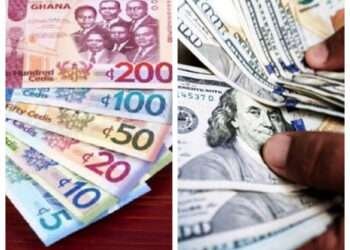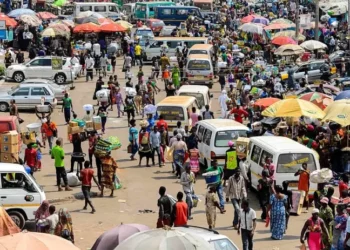Ghana’s economy is showing remarkable signs of recovery, drawing commendation from the International Monetary Fund (IMF) as the country advances toward the successful completion of its ongoing programme.
Bank of Ghana Governor, Dr. Johnson Asiama, has assured that Ghana is firmly on track to exit the current IMF programme by next year—well ahead of initial expectations.
Speaking during an interaction with Abebe Selassie, the IMF’s Director of the African Department, on the sidelines of the IMF/World Bank Annual Meetings in Washington DC, Dr. Asiama expressed confidence in the country’s economic trajectory. He noted that Ghana is currently ahead of most of the performance benchmarks and structural targets agreed upon under the IMF programme, adding that recent macroeconomic indicators reveal strong and sustained recovery.
According to Dr. Asiama, “The country has worked hard to undertake the necessary reforms to stabilise the economy. The current developments show that we have delivered and turned things around.”
Ahead of the IMF Programme Targets
Ghana entered into a three-year Extended Credit Facility (ECF) programme with the IMF in 2023, following a period of severe fiscal stress and external shocks that weakened the economy. The programme, which is expected to end in May 2026, provided a critical financial buffer of over US$3 billion to help restore macroeconomic stability and confidence.
However, Dr. Asiama revealed that Ghana’s performance has been stronger than projected, allowing the government to fast-track several reform targets. “When this administration took over, there were doubts about whether we could carry on with the programme. But we have proven that we can deliver,” he emphasized.
Reports of a possible extension of the IMF arrangement had surfaced earlier, with some analysts suggesting it might be necessary to reassure investors and development partners. Yet, Dr. Asiama’s remarks have allayed such fears, reaffirming that Ghana is on course to exit the programme on schedule, or even earlier.
Inflation Falls to Single Digits for the First Time in Years
One of the clearest indicators of Ghana’s economic turnaround has been the sharp decline in inflation, which stood at a worrying high in 2023 and 2024. Through a series of coordinated policy measures by the Bank of Ghana, inflation has now dropped to 9.4 percent as of September 2025—the lowest in several years and within the central bank’s target band.
Dr. Asiama explained that the Bank of Ghana took bold steps to restore price stability by tightening monetary policy and enhancing liquidity management. “We met an economy that was challenged, with high levels of inflation, and this was our priority when this administration took over,” he stated.
The central bank raised its monetary policy rate multiple times during the reform period to curb inflationary pressures and maintain exchange rate stability. These actions, coupled with fiscal consolidation by the government, have contributed to restoring confidence in the economy.
“Our policies going forward will be data-driven and adaptable to changes in the economy,” the Governor noted, emphasizing that sustaining single-digit inflation will remain the central bank’s focus.
Gold for Reserves Programme Strengthens Ghana’s FX Position
Another major success story under the current reform regime has been the Gold for Reserves Programme, an initiative introduced by the Bank of Ghana to bolster foreign exchange reserves and stabilize the cedi.
According to Dr. Asiama, the programme has “yielded positive results and enabled the Bank of Ghana to build its reserves,” helping to cushion the economy against external shocks. By purchasing gold domestically and using it to support the country’s reserve assets, the central bank has been able to reduce dependence on foreign exchange markets and mitigate the impact of global currency fluctuations.
This has not only supported exchange rate stability but also promoted value addition within Ghana’s mining sector, creating jobs and enhancing export earnings.
Structured Foreign Exchange Framework Introduced
To complement these achievements, the Bank of Ghana has, in collaboration with the IMF, developed a structured foreign exchange operations framework aimed at improving market transparency and reducing volatility.
“As these framework changes take place, they will bring further transparency to our foreign exchange market operations and help ease volatilities in the market.”
Dr. Asiama
The framework provides a more predictable mechanism for managing FX flows, ensuring that interventions in the market are data-based and rule-governed. This system, coupled with stronger reserves, has brought stability to the exchange rate environment, restoring business and investor confidence.
Beyond short-term stabilization, the Bank of Ghana Governor highlighted several structural reforms embedded in the IMF programme designed to strengthen the central bank’s operational independence and improve monetary policy effectiveness.
He underscored that these reforms will provide a foundation for long-term growth and resilience.
“The current ECF programme has also introduced a lot of structural reforms, including those designed to strengthen the Bank of Ghana’s operational capacity and its monetary policy framework.”
Dr. Asiama
The central bank has also adopted a forward-looking monetary strategy anchored on robust data analytics, improved forecasting, and enhanced policy communication to foster credibility and predictability.
A Confident Path to IMF Independence
Ghana’s progress under the IMF programme has attracted international attention, with IMF officials reportedly impressed by the scale and speed of recovery. The collaboration between fiscal authorities and the central bank has been lauded as a model for effective policy coordination in the face of global challenges.
As Ghana moves closer to exiting the IMF arrangement, the focus now shifts to sustaining the gains achieved. Dr. Asiama reaffirmed his confidence in Ghana’s economic outlook, saying,
“Now that inflation is within the target band, the challenge is to sustain the gains by continuing to implement sound monetary and exchange rate policies to ensure inflation remains within target.”
Dr. Asiama
With inflation tamed, reserves rebuilt, and investor confidence returning, Ghana’s economic revival tells a story of resilience, discipline, and determination—a story that is now earning praise from the very institution that once had to step in to rescue it.
READ ALSO: BoG Ends UBA’s FX Suspension After Satisfactory Remedial Measures






















